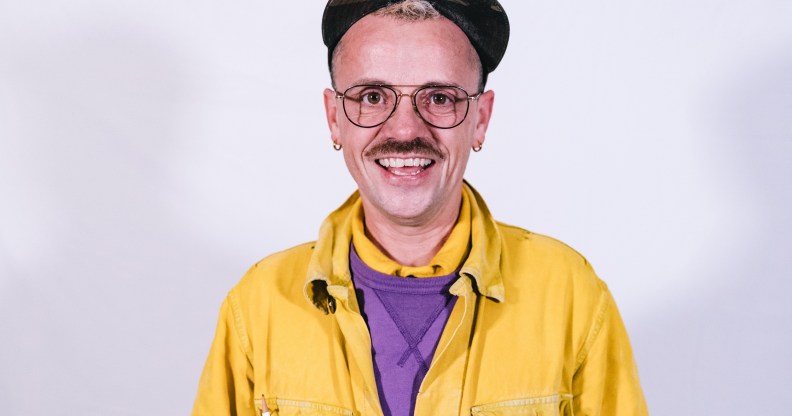Meet EJ Scott, whose new exhibition Queer the Pier delves into the history of the queerest city in the UK

Queer the Pier curator EJ Scott. (Rosie Powell)
An unprecedented exhibition that delves deep into Brighton’s queer history has been put together by curator EJ Scott.
Scott, known for his work with the Museum of Transology, led a process through which LGBT+ Brighton residents sent in objects, stories and images to be included in the new community exhibition: Queer the Pier.
Queer the Pier takes Brighton’s renowned pier as a symbol of the city’s ongoing reputation as a place where people of all genders, sexualities, social classes and ethnic and religious backgrounds have sought pleasure, liberation and fulfilment.
It’s a timely reminder that LGBT+ people have always been part of Brighton’s story, and visitors will be able to explore 200 years of LGBT+ people’s experiences in Sussex.
PinkNews spoke to EJ ahead of the exhibition opening to the public on February 22.
Hi EJ, thank you for talking to us! So, what can people coming to Queer The Pier expect to see?
Visitors to the Queer the Pier exhibition will find themselves on a reimagined queer pier complete with arcade games that capture local LGBTIQ+ history.
Over 30 community curators have selected films, drag costumes, photography and historical artefacts from both private collections and the permanent collection of Brighton Royal Pavilion and Museums.
What’s your favourite bit of the exhibition?
LGBTIQ+ members of the Roma, Gypsy and Traveller community worked with local artist Delaine Le Bas to create new messages for the Victorian Fortune Telling Machine that has been repaired and is now working again!
The exhibition also has a codebreaker machine that explores local queer oral history collections.
The Liza Manelli puppet made and used by drag artist Alfie Ordinary is just hilarious. And the collection of flyers really gives you a sense of the local activist movement that has tackled the Aids Crisis and the introduction of Section 28 in the 1980s.
The exhibition is both playful and powerful at the same time.
Do you think people will be surprised to learn about Brighton’s queer history?
No, not at all. Brighton is home to the largest percentage of LGBTIQ+ people in the UK and has the biggest Pride and Trans Pride festivals as well, so everyone knows queer culture is in the city’s DNA.
This is a local exhibition by local people in the local museum, and is relevant to everyone who lives and visits here.
It must be amazing to put on an exhibition like this and select what goes into it… I always wonder, though, about what gets left out. Do you have a strict selection process? Are there items you love but that don’t work for the exhibition, and if so how do you feel about not putting them in?
Queer history is sometimes a difficult area to explore, as there are many stories that remain hidden and those that aren’t lost are often deeply buried and require a great deal of research to unearth. So this exhibition plays on that.
The Community Curators have designed pier games that represent our queer ancestors. The games take the place of missing lives not represented by objects in the collection.
It’s a different type of curation by members of the community who wanted to choose what stories they tell about their own people in the past and how those stories are told.
What do you hope people take away from Queer The Pier?
We hope that visitors learn more about the central role queer culture has played in shaping the identity of the city we live in today.
On a practical level, visitors can also take home one of our zines – there’s a QTIPOC zine, a Queer the Pier exhibition zine, a queer Roma zine and more being made all the time!
Queer the Pier opens at the Brighton Museum & Art Gallery on February 22.

